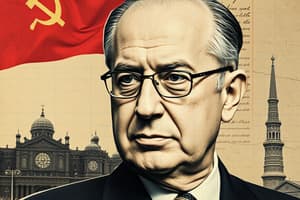Podcast
Questions and Answers
What was the main reason for the involvement of Catholic France in the 30 Years War?
What was the main reason for the involvement of Catholic France in the 30 Years War?
- To defeat the rival Catholic Holy Roman emperor (correct)
- To gain control of international businesses
- To establish dominance over other European monarchs
- To support the Lutheran side
What event settled the 30 Years War and led to international peace in Europe for over 150 years?
What event settled the 30 Years War and led to international peace in Europe for over 150 years?
- The Peace of Augsburg
- The signing of the Magna Carta
- Treaty of Westphalia in 1648 (correct)
- The Council of Trent
What did Martin Luther denounce in 1517, leading to a challenge to the Roman Catholic church?
What did Martin Luther denounce in 1517, leading to a challenge to the Roman Catholic church?
- The sacrament of baptism
- The practice of confession
- The authority of the Pope
- The sale of indulgences (correct)
What did European monarchs use to impress their subjects and justify their rule?
What did European monarchs use to impress their subjects and justify their rule?
Which countries had constitutions created by nobles and the bourgeoisie that limited rulers’ powers somewhat?
Which countries had constitutions created by nobles and the bourgeoisie that limited rulers’ powers somewhat?
Study Notes
Involvement of Catholic France in the 30 Years War
- Catholic France, under King Louis XIII, supported Protestant princes during the 30 Years war.
- France’s main goal was to curb the growing power of the Habsburg Empire, which threatened its dominance in Europe.
- France feared that the victory of the Habsburg Empire would change the balance of power.
Peace of Westphalia
- The Peace of Westphalia, signed in 1648, marked the end of the 30 Years War.
- This treaty established a new order in Europe, based on national sovereignty and religious toleration.
- It recognized the independent states of the Holy Roman Empire, ensuring peace for over 150 years.
Martin Luther and the Reformation
- Martin Luther, a German monk, challenged the Roman Catholic church in 1517.
- He opposed the sale of indulgences, claiming that salvation could only be achieved through faith.
- Luther’s teachings sparked the Protestant Reformation.
European Monarchs and Divine Right
- European monarchs used the concept of divine right to impress their subjects and justify their rule.
- They claimed that their authority was granted directly by God, making them accountable to God alone.
- This idea gave monarchs absolute authority and power over society.
Limited Monarchy
- Some countries, such as England and the Netherlands, developed constitutional monarchies in the 17th and 18th centuries.
- These constitutions were created by nobles and the bourgeoisie, and they established limitations on the powers of monarchs.
- These limitations ensured greater political representation and participation, contributing to a degree of political stability.
Studying That Suits You
Use AI to generate personalized quizzes and flashcards to suit your learning preferences.
Description
Test your knowledge of the 30 Years War and the Treaty of Westphalia with this quiz. Explore the causes, key events, and outcomes of the conflict that shaped European history for over 150 years.




